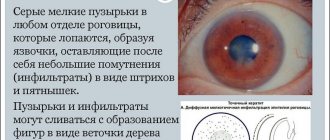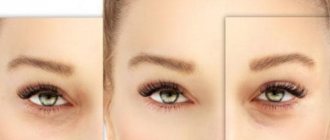Laser vision correction is an operation to restore vision in patients with myopia, farsightedness and astigmatism, performed using a high-precision excimer laser, thanks to which a new shape of the eye cornea is modeled and its optical power is changed, which results in increased visual acuity after laser surgery.
Laser vision correction in the treatment of myopia, farsightedness and astigmatism has been carried out for the past thirty years. As practice has shown, laser vision correction surgery is a gentle, safe, low-traumatic and highly effective method of treating refractive errors, allowing the patient after laser vision correction surgery to forever get rid of the need to wear glasses or contact lenses, providing not only an excellent appearance, but also a completely different quality of life and visual comfort.
Glasses, especially for high myopia and farsightedness, are uncomfortable, have an unaesthetic appearance due to thick glasses, cause distortion and deformation of the image and are a serious limitation in sports and social activities. Contact lenses provide better vision, but can be poorly tolerated and require special care and periodic replacement. When contact lenses and glasses cannot provide a high level of visual comfort or are incompatible with an active lifestyle, laser vision correction is the most appropriate solution.
Laser vision correction is carried out to eliminate imperfections in the optical system of the eye, thereby completely getting rid of glasses or contact lenses. It should be clarified that any concomitant ocular diseases remain unchanged, and the patient must be realistic in his expectations of the postoperative result.
Laser vision correction – what is it?
The human eye is a complex optical device in which light rays are refracted by several “natural” lenses - the cornea, lens, vitreous - and focused on the retina. In the retina of the eye, a nerve impulse is formed and transmitted along the optic nerve to the corresponding parts of the brain, which process the information received, as a result of which a person receives a clear image of the object in question.
With refractive errors - astigmatism, farsightedness or myopia - the light rays are refracted insufficiently or, conversely, excessively, as a result of which they are not focused on the retina, and the image turns out blurry and unclear. The essence of laser vision correction is to change the refractive system of the eye so that light rays can be accurately focused on the retina and the image is clear. Moreover, unlike contact lenses or glasses, laser correction radically solves the problem of poor vision.
During laser correction, one of the optical refractive media of the eye, the cornea, is exposed. The laser, according to a given software algorithm, evaporates microscopic fractions of the cornea with an ultraviolet laser beam, modeling its shape so that the light rays are refracted and focused precisely on the retina.
Preparing for surgery: what you need to know?
You have been checked by a doctor, there are no contraindications - a date is set for which you need to prepare. First of all morally. Because on day X itself you should be as calm and relaxed as possible. There is no need to be afraid or worry too much.
Do you wear contact lenses? Then two weeks before the operation you should abandon them and completely forget them forever - after all, you will see well later. You are allowed to wear glasses.
— Contact lenses affect the cornea - it can change its curvature. Therefore, during diagnosis it will be difficult to determine the magnitude of the disorders and calculate the volume of surgical intervention. And we won’t get the result we wanted,” the specialist emphasizes.
Before surgery, you should not have any eye inflammation. And a note to girls: you shouldn’t wear makeup or use eye creams the day before your correction.
Laser vision correction: indications and limitations
Laser vision correction in many countries is considered a purely cosmetic operation. However, like any operation, vision correction, depending on the method used, has its limitations and contraindications.
Indications for laser vision correction:
- Myopia degree from -1.0 to -15.0 diopters;
- Farsightedness degree from +1.0 to 6.0 diopters;
- Astigmatism degree from ±0.5 to ±5.0 diopters.
Contraindications to laser vision correction:
Contraindications to laser vision correction can be divided into two large groups – ocular contraindications and general ones. Contraindications from the organ of vision are determined during a comprehensive ophthalmological examination. These include:
- Anatomically determined insufficient corneal thickness (450 microns or less) or acquired as a result of keratoconus;
- The patient has a history of glaucoma or cataracts, or retinal detachment;
- Progressive myopia;
- Inflammatory diseases of the eyeball, dystrophy and traumatic damage to the cornea;
- The only promising eye.
General contraindications to laser correction:
- Diseases of the immune system (collagenosis, arthritis);
- Diabetes mellitus in the stage of decompensation;
- Primary and secondary immunodeficiency conditions (HIV);
- Systemic syndromes and diseases that have a negative impact on the healing process;
- Pregnancy and breastfeeding period.
The operation is over: what next?
Let's go in order. An hour after the correction, the doctor examines the patient and gives recommendations on treatment and further lifestyle. It will be great if you have a loved one with you on day X who will help you return home. Typically, after surgery, the patient is on sick leave for up to seven days, but if complications arise, it can be extended. Anti-inflammatory drops and tear substitutes are prescribed. The latter are mandatory, since during the operation the tear film, which protects our organ of vision from external influences, may be damaged. In general, we should not forget to use medications: this is very important for restoring vision. You cannot visit the pool and sauna, engage in contact sports, drink alcohol, rub your eyes or use cosmetics. For the first time after surgery, you must wear sunglasses.
Photo is for illustrative purposes only, pixabay.com
— When you visit again, the doctor checks your condition. How the flap fits, how visual acuity is adjusted, whether there are any inflammatory phenomena - in general, he examines absolutely everything. If there are no complications, then after a week people go to work as usual,” the doctor says with a smile.
It happens that after some time, for example after three or four months, vision may begin to decline a little. There's nothing wrong with that. As T. Terekhina said, you need to see a doctor who, after an examination, if you remain the same healthy person without any sudden illnesses, prescribes a repeat operation. This is a fairly common practice.
Laser vision correction surgery
Laser vision correction took its first steps about 50 years ago, but over the past 30 years, techniques using an excimer laser, which emits ultraviolet radiation that can cause evaporation of thin layers of the cornea without damaging the underlying intraocular structures, have become prevalent.
Modern refractive surgery uses a number of excimer laser vision correction techniques, thanks to which vision can be restored, but the most popular are two options for laser vision correction - Photorefractive keratectomy (PRK) and Laser keratomileusis (Lasik) and their various modifications, such as Femto Lasik.
FEMTO LASIK Femtosecond laser FemtoLasik is a new frontier in refractive surgery in the treatment of refractive errors using a pulsed femtosecond laser...
PRK Photorefractive keratectomy Laser vision correction for myopia, farsightedness and astigmatism using the photorefractive…
LASIK Laser keratomileusis Lasik is a method of laser correction of myopia, farsightedness and high degrees of astigmatism...
When can the procedure be performed with relative contraindications?
In case of relative contraindications, it is possible to correct vision using a laser, but only after the patient’s condition has stabilized:
- If a person has conjunctivitis or other infectious eye diseases, then he should wait until complete recovery.
- You should not carry out vision correction if you have a cold or flu; you need to wait until you have fully recovered.
- It is worth refusing to perform surgery for a while in case of exacerbation of chronic diseases.
- Corrections should not be made when taking certain medications. If a woman takes hormonal contraceptives, additional consultation with a gynecologist is necessary.
- If the patient suffers from hypertension, then correction can be made only after the pressure is normalized.
The correction itself takes no more than 10 minutes, but preparation for the procedure may take several days. The patient must first undergo a full examination and undergo a series of tests.
Before performing the operation, the doctor carefully examines the patient’s medical history and the conclusions of specialists.
What can happen after surgery?
It should be remembered that laser correction in the standard version does not provide for the presence of severe pathologies as complications from the procedure. Some patients still complain of significant aggravating factors that prevented them from enjoying the positive effect of the operation for a long or short time:
| Factor | Description |
| Long-term epithelial healing process | Doctors believe that this process in a healthy person should take place completely within a few hours. In some cases, people report pain and other characteristic signs of damaged epithelium for several days after the procedure, which prevents people from working or pursuing their hobbies |
| The emergence of various light and color effects | Most people suffering from this contraindication note that flies begin to fly in front of their eyes, and this phenomenon does not go away quickly. Sometimes people complain of glare, which can be compared to temporary blindness from bright light. In everyday life, this can happen when driving a car when exposed to headlights or mirror surfaces from an oncoming vehicle. |
These unpleasant consequences are guaranteed to pass, and usually do not leave other negative feelings or consequences. In order to speed up this process, you just need to carefully listen to the advice of the ophthalmologist, and if necessary, come to him for an appointment and voice your own problem.
Myths about restrictions after surgery
Despite the fact that laser correction has been carried out for more than thirty years, some patients are still distrustful of such treatment.
This happens not only due to fear of irreversible consequences, but also under the influence of myths that cast such a procedure in an unfavorable light.
One of these misconceptions is a lifelong restriction in terms of sports and physical activity, which can damage the vessels and tissues of the operated organs of vision.
In fact, such restrictions only apply to the rehabilitation period after the procedure, which lasts no more than a month.
It is worth noting! After this period, provided that healing is successful and there are no complications, from the point of view of physical activity, a person who has undergone surgery is no different from anyone else.
Also, many believe that after laser correction it is necessary to observe constant restrictions on eye strain, that is, use the computer less, watch TV and read less.
In fact, the likelihood of vision deterioration in such cases is unlikely and such a disorder occurs not as a result of eye strain, but when temporary spasms of the lens occur against this background.
But this can be prevented by introducing short, frequent breaks into your work at the computer or while watching TV, and if necessary, you can use ophthalmic drops to relieve spasms.
Another myth concerns further age-related deterioration of vision after surgery.
Some believe that if a person undergoes laser correction at the age of 20-25, then by about 40 years the cornea, once exposed to the laser, will begin to collapse.
This myth has no basis, and technically the excised and subsequently healed cornea is no different from other tissues subject to surgical intervention.
Important! The cornea cannot be destroyed after this, just as sutures and scars on the skin left after the intervention of a surgeon cannot be destroyed.
The truth about consequences
There are many different stories and lists of negative consequences published on the Internet, but the specialist assures: this is very rare.
— Complications may appear in the postoperative period if the patient does not follow the doctor’s recommendations. For example, inflammation of the cornea (keratitis) may develop, which worsens visual acuity. Or the cornea may become cloudy in such a way that corneal dystrophy develops, which is very difficult to cure. But this, I emphasize, is a very rare case. In my work, I have never met patients for whom something went wrong,” the ophthalmologist reassures.
So there is no need to be afraid. Laser correction is a modern, safe way to restore vision if you have no contraindications. If you meet all the criteria and want to stop wearing glasses or contact lenses, then surgery using modern technological lasers like LASIK is a win-win option. The main thing is to listen carefully to what the doctor says and follow all his instructions.











